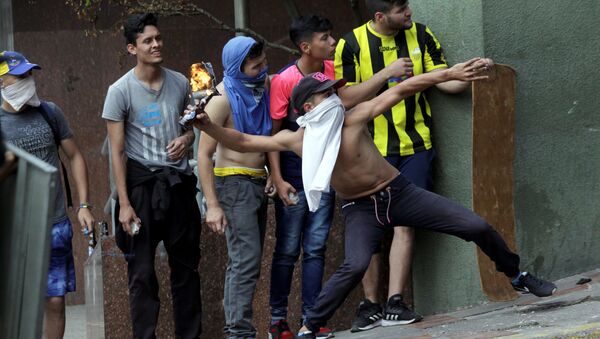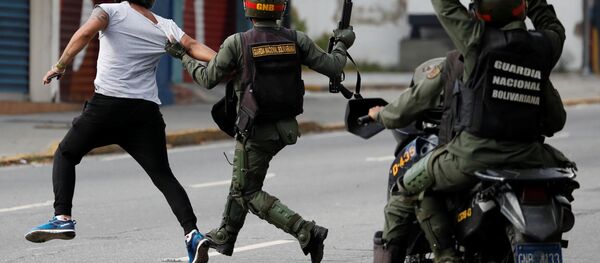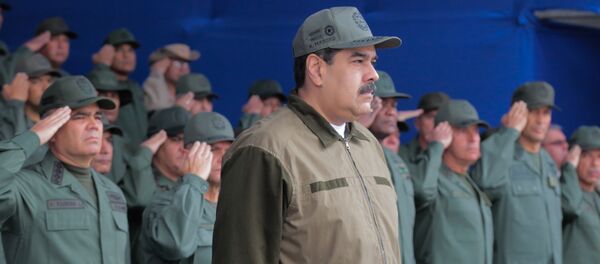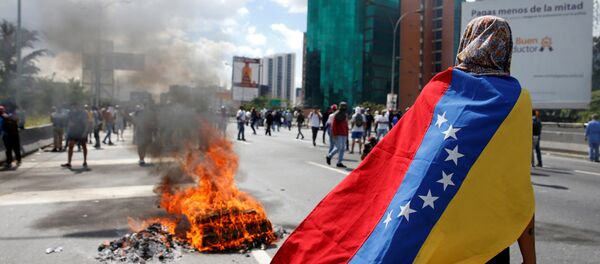While numerous governments have joined the US in supporting Guaido, including Brazil, Argentina and Peru, others such as Bolivia and Mexico have stood fast by Maduro. Meanwhile, Venezuelan Defense Minister Vladimir Padrino announced on Twitter the Venezuelan military would not accepted a president imposed by "dark interests" and that it would defend Venezuela's constitution and national sovereignty.
Radio Sputnik's Loud and Clear spoke Wednesday with Lucas Koerner and Paul Dobson, two writers for VenezuelAnalysis.com, both of whom are in Venezuela.
"The Organization of American States has historically been a puppet organization of the White House, to organize their control in what was their backyard, in Latin America," Dobson explained. "The current secretary-general of the OAS, he is a fervent anti-Maduro critic, he loves using social media to criticize anything going on in Venezuela, and it's really not surprising that a number of the [member] states have come out in bloc to not recognize Maduro and to recognize" Guaido.
Koerner warned that Venezuelan state assets in other countries, including embassies but most importantly the state oil company Citgo, could be seized by hostile states, which would "severely impact the economy of the country." The danger of an oil embargo also cannot be dismissed, as the Trump administration has made clear that "all options are on the table."
Koerner also noted that the administration of US President Donald Trump is closely aligned with the far-right governments in both Brazil and Colombia, which have expressed outright disdain for the Caracas government. Brazilian President Jair Bolsonaro has also expressed a desire to invade Venezuela and overthrow the "communists" there — an attack that could very well happen with US air support.
"We need to be vigilant, we need to oppose it, and we need to be in the streets," Koerner urged.
Indeed, there have also been protests in other countries, including in Washington, DC, where anti-war demonstrators gathered outside the Venezuelan embassy to reject their government's meddling in Venezuela's affairs.
"Peace for Venezuela, no to intervention" pic.twitter.com/buf9pkYWzb
— Alex Rubinstein (@RealAlexRubi) January 24, 2019
They chanted "Hands off Venezuela" and "Maduro, si, Yanquis, no." Another demonstration is planned for Thursday in front of the White House.
Protest outside #Venezuela embassy in #DC is probably first of many opposing #US intervention. pic.twitter.com/tlMvBJT5Ft
— dparvaz🧿 (@dparvaz) January 24, 2019
Numerous other world politicians, including France's Jean-Luc Melenchon, head of the left-wing La France Insoumise party, have also denounced the violation of Venezuela's sovereignty.
Maduro has formally cut diplomatic ties with the US, accusing it of attempting to stage a coup d'etat and giving US diplomats 72 hours to leave the country, Sputnik reported.
Although widespread protests both for and against Maduro's government have spread across the country in the days since his swearing in, violence intensified Wednesday with opposition protesters attacking symbols of the government, including burning the regional headquarters of the United Socialist Party of Venezuela (PSUV), Maduro's party, in the city of Maturin. Pro-government demonstrators seem to have remained peaceful so far, but the police and national guard responded to disturbances with tear gas and buckshot. At least two people died Wednesday.
Dobson, reporting from the city of Merida, explained that Guaido's proclaiming himself president is "completely illegal under Venezuelan law and completely unconstitutional under the wording of Venezuela's constitution."
Dobson said that in a speech following Guaido's declaration, Maduro spoke to a crowd of followers and "stressed the importance of national sovereignty and the right to self-determination," reminding them that it's voters who select the leaders of their country and not Trump.
"This is an attempted coup. The democratically elected government of Nicolas Maduro has not yet been overthrown — it has been challenged for power by an unknown politician who has never run for election in his life, at least for the presidency."
Voter turnout in the May 2018 Venezuelan presidential election was 46% of registered voters. Of those roughly 9.4 million ppl, 2/3 of them voted for @maduro_en in what @CarterCenter called "the best [elections] in the world."
— Morgan Artyukhina (@LavenderNRed) January 23, 2019
Who elected Juan Guaidó president? Nobody!
Dobson wasn't sure if Maduro would arrest Guaido or if arresting Guaido would trigger a military intervention, but he did note that Guaido already had a building treason case against him even before Wednesday's events, and that "if this had happened in any other country in the world, if yourself stood up in the US Congress and declared yourself president, you would be locked away in a matter of seconds, I'm pretty sure."
"It's worth remembering in Venezuela, we've lived through this two or three times in the last 20 years," Dobson told hosts Brian Becker and John Kiriakou. "In 2002, it was a short-lived coup d'etat, 2014 and 2017 when we saw attempted insurgency on the streets across the country and widespread violence inspired by opposition activists."
"This is why I think it's very important to look at what Juan Guaido sends his followers to do. If he calls them into the streets, if he calls them to take over local government offices by force, or so on and so on, something he has yet to do, this will obviously spark violence. But the more mature response from him would be to try to find a peaceful way to achieve his political objectives."
Koerner, reporting from the capital city of Caracas, noted that locals feared a third night of violence. However, he noted that while much of the violence was happening in the "popular, working class areas" of the city, "these are people coming in from outside the barrios — perhaps being paid, we don't know — to destroy public and private property, provoke confrontations, attack social missions, etc."
"Chavista organizations are doing their best to keep the peace, keep the calm," Koerner said, but he added that "a lot would depend on what actions the opposition and those affiliated with the opposition engage in."






